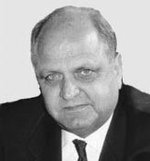Mike Moore
|
|
This page is about the New Zealand politician and Director-General of the World Trade Organisation. For others of the same name, see Michael Moore (disambiguation).
Michael Kenneth Moore (born 1949) is a politician from New Zealand who has served both as Prime Minister of New Zealand and Director-General of the World Trade Organization.
Moore was born in the town of Whakatane, a small town in New Zealand's Bay of Plenty region. He held a number of jobs, working in a meat processing works, as a construction worker, and in the printing industry. He quickly became involved in the trade union movement, and was elected to the Auckland Trades Council when only 17 years old. His union work prompted him to become involved with the Labour Party, a party with strong traditional ties to the unions.
In the 1972 election Moore successfully stood as the Labour Party candidate for Eden, an electorate in the city of Auckland. Aged 23, he was one of the youngest people ever to be elected to the New Zealand Parliament. Throughout his early career in parliament, Moore served as the Labour Party's spokesperson on matters such as housing, regional development, the environment, and tourism. He lost his Eden electorate in Robert Muldoon's 1975 landslide; having moved to Christchurch, he returned to Parliament at the 1978 election as MP for the electorate of Christchurch North.
The 1984 election saw the Labour Party, led by David Lange, defeat the incumbent National Party government of Robert Muldoon. Moore became Minister of Overseas Trade and Marketing, and later became Minister of External Affairs (predecessor to the modern Foreign Affairs portfolio). He also had a number of smaller roles, including that of Minister for the America's Cup in 1988/1989.
The new government quickly became entangled in debates surrounding economic policy, however - the Minister of Finance, Roger Douglas, was keen to pursue a free market monetarist policy, which was strongly at odds with Labour's traditional left-wing views. The unions were particularly strong in their opposition to the reforms that Douglas introduced. Despite his union background, Moore became increasingly aligned with the Douglas faction, although not to the same extent as many others.
After a long period of conflict, Lange managed to force Douglas to resign in mid-1989. However, Lange's own position had become weakened, and he himself resigned a month later. He was replaced by Geoffrey Palmer. Palmer, however, was seen as too distant from ordinary New Zealanders, focusing most of his attention on legal and constitutional matters. Palmer was also seen as "too academic" and "too politically correct". In September 1990, eight weeks before the 1990 election, Moore replaced Palmer as leader of the Labour Party (and therefore, as Prime Minister).
In the election, Labour was heavily defeated by the National Party, led by Jim Bolger. Moore became Leader of the Opposition. However, after the election of 1993 (which Labour failed to win), he was replaced as leader of the Labour Party by Helen Clark. Moore was considerably embittered by this, believing himself to have been betrayed by the party he had worked for. Although Moore agreed to become Labour's spokesperson on foreign affairs and trade, he also considered establishing a new centrist party (tentatively named the Democratic Coalition) along with rebel National MP Michael Laws and several other dissident Labour and National politicians. Moore eventually decided against a new party, and retired from parliament in 1999. He was made a member of the Order of New Zealand that same year.
World Trade Organisation career
During his political career Moore had taken a keen interest in international trade issues. He became the favoured candidate of one group of countries for the post of director-general of the World Trade Organisation. After a period of heated negotiation he obtained the post, taking the first half of a six year term shared with Supachai Panitchpakdi, officially taking office on 1 September 1999. He soon found himself in a difficult position, a figure of hate for the anti-globalization movement and also blamed for the failure of the 3rd ministerial conference in Seattle. Moore's term ended on 31 August 2002.
After leaving the World Trade Organization, Moore was appointed to the Global Commission on International Migration, a United Nations organization launched at the end of 2003.
His special adviser in the WTO was Philippe Legrain.
| Preceded by: Renato Ruggiero | Director-General of the World Trade Organization 1999–2002 | Succeeded by: Supachai Panitchpakdi |

